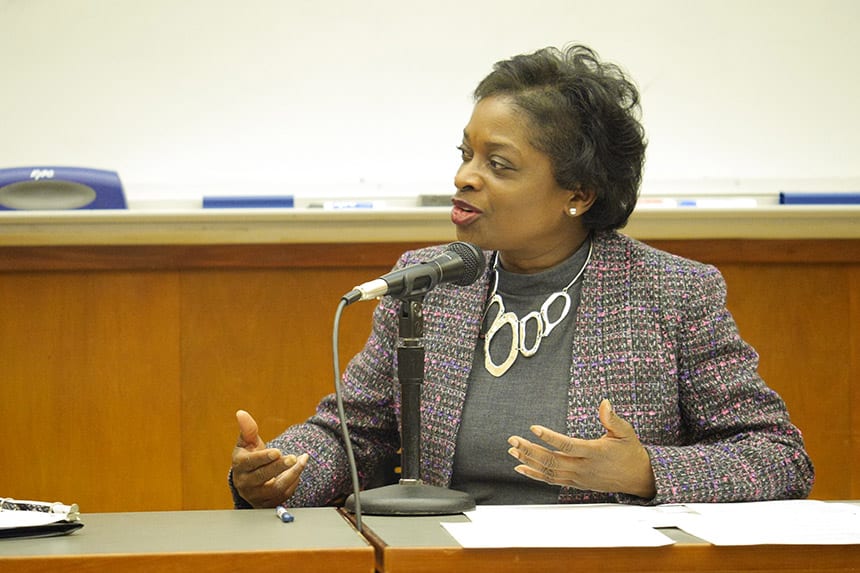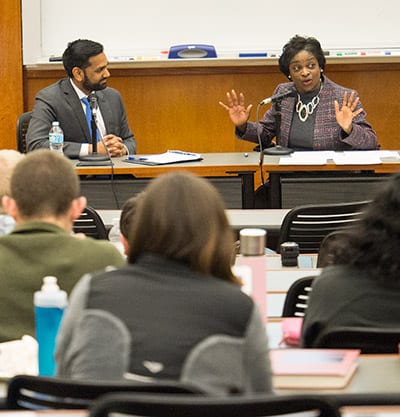
By Andrew Cohen
Speaking to a crowded gathering of Berkeley Law students on March 5, Mignon Clyburn was far from neutral about net neutrality.
A commissioner at the Federal Communications Commission (FCC), Clyburn maintained a professional tone throughout her conversation with Professor Tejas Narechania and ensuing Q&A. But she made clear her concern about the FCC’s recent vote to repeal net neutrality—the principle that internet service providers (ISPs) should not be allowed to speed up, slow down or block content, applications, or web sites.
“That shifted our approach from a consumer lens to an industry lens,” Clyburn said of the new guidelines, scheduled to take effect April 28. Supporters of the 3-2 vote along party lines argued ISPs have no financial incentive to impede online users. But Clyburn noted “there were 47,000 complaints to the contrary you won’t hear about, because they weren’t part of the record” when the decision was made.
“Chair Ajit Pai said we weren’t going to pay attention to individual comments, just to detailed submissions regarding net neutrality,” she lamented. “Who’s going to issue long, detailed filings? Not a mom and pop company, or an individual. It’s going to be an industry providing paid-for filings.”
In 2015, the FCC passed rules aimed at ensuring that the internet be an open platform for democratic participation and economic innovation. The FCC prohibited ISPs such as Verizon and Comcast from slowing down or blocking access to online content—and from prioritizing their own content.
In December 2017, however, the FCC vote repealed those guidelines. The telecom industry endorsed the new plan, contending that prior regulation deterred broadband investment and innovation. Critics countered that internet providers will now have too much control over how online content is delivered.

Clyburn said most Americans favor the 2015 rules, and that 22 state attorney generals have called for upholding them.
The fight ahead
Student interest in a net neutrality event prompted Narechania, who has advised the FCC on net neutrality matters and served as special counsel there, to contact Clyburn’s office through a former colleague. He foresees this topic heating up even more after Washington state last week passed a bill in objection to the FCC vote.
“That will likely be challenged,” he said. “The FCC’s order will also be challenged. There’s going to be a lot of activity here and that will keep the topic very salient. The internet is a pervasive technology, so changes to norms or laws that apply to it can have significant effects on aspects of our social, political, and commercial lives.”
Sponsored by school’s American Constitution Society for Law and Policy, Consumer Advocacy and Protection Society, and Berkeley Center for Law & Technology, the event also tackled how the new rules may impact small businesses. A growing number of ISPs have ancillary or complementary business interests, including a small alarm company that filed a complaint about experiencing problems with a provider that also had an alarm service.
“If a small business has to explain why an image is fuzzy or its site navigation is slow… the customer will just move on to a competitor,” Clyburn said. “All data that travels over the internet should be treated equally.”
She also worries that the FCC’s diminished oversight power will stifle innovation.
“If there’s not a regulatory cop on the beat who will prevent harm from happening in real time, that hurts all of us,” she said. “Who’s there not only to protect you, but to create a climate that will spur innovation and investment? How many great ideas won’t be coming into market because people fear a fight from a multi-billion dollar corporation?”
Pyus and others have sought to allay those concerns, contending that the Federal Trade Commission (FTC) will help police harms caused by ISPs. But the FTC’s enforcement power, Clyburn noted, is only triggered after proving unfair and deceptive practices.
“Would you prefer me to give you a checkup to help you stay on a helpful path, or would you prefer to meet in an emergency room when it could be too late?” she said. “The FCC supposed to provide consumer protections in real-time. The FTC only comes in after you’re able to prove harm—that can be years later, and by that time you’re out of business or have suffered economic hardship.”
Clyburn urged students to make their voices heard to state and federal government representatives on net neutrality, regardless of their position on the FCC’s action, “and, as paying consumers, to demand accountability from your internet providers.”